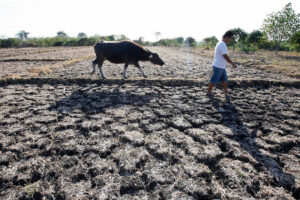




Inflation Update: Nowhere but up
 DOWNLOAD
DOWNLOAD

Philippines Trade Update: Imports weaken on tepid demand
 DOWNLOAD
DOWNLOAD

Policy Rate Updates: BSP outlook — cloudy with a chance of rate cut
 DOWNLOAD
DOWNLOAD


El Niño may derail agri sector recovery

EL NIÑO may weigh on Philippine economic growth this year, as the agriculture sector is vulnerable to severe dry spells brought by the weather phenomenon, analysts said.
“The El Niño phenomenon’s impact is big (on) the agriculture sector but has economy-wide effects as well. Strong El Niño events lead to GDP (gross domestic product) losses, while strong La Niña events lead to smaller GDP gains,” Union Bank of the Philippines, Inc. Chief Economist Ruben Carlo O. Asuncion said in a Viber message.
National GDP losses during a strong El Niño event could reach up to $3.3 billion, he said.
National Economic and Development Authority (NEDA) Secretary Arsenio M. Balisacan last week said that while El Niño will directly affect agricultural production, it “may not deeply impact the economy.”
“During the strong El Niño years, rice production could decrease by double digits. Even a slight El Niño could cause agricultural production to decrease by 1-2%,” he said.
According to the state weather agency, the El Niño weather pattern may emerge in the next three months with an 80% probability and is likely to persist until the first quarter of 2024. This would increase the likelihood of below-normal rainfall conditions, which could bring dry spells in some areas.
“The El Niño drought later this year up to early 2024 is seen to reduce agricultural output and could lead to some pick up in prices and inflation but would not have a significant drag on GDP growth,” Rizal Commercial Banking Corp. Chief Economist Michael L. Ricafort said in a Viber message.
Economic managers are targeting 6-7% GDP growth this year. In the first quarter, agricultural output expanded by 2.1%, a turnaround from the 0.3% decline in the same quarter a year ago.
An El Niño weather event hit the Philippines in 2019, with agricultural damage reaching up to P8 billion.
“The impact of El Niño will be very significant. The worst recorded in Philippine history was back in 1997-1998, when rainfall was only at half of historical levels, causing the lack of rainfall in two-thirds of the country. Forest fires ensued, and 10,000 hectares of natural forests went up in flames,” Mr. Asuncion said.
During the country’s worst El Niño episode in 1998, the economy shrank by 0.5% as agricultural production contracted by 7%.
Mr. Asuncion said GDP losses due to El Niño would vary across regions.
“Agricultural GDP falls by 1.9% in Luzon during a strong El Niño, but by 1.4% in Mindanao,” he added.
Danilo V. Fausto, president of the Philippine Chamber of Agriculture and Food, Inc., said El Niño is definitely a threat to agriculture, adding that it can reduce rice production by as much as 30%.
In a phone interview, Mr. Fausto said it is crucial that farmers start planting in the fourth quarter when El Niño is expected to hit, or else the harvest early next year will be affected.
“The planting season is November, December. If there’s no water by then, especially irrigation, a certain percentage of Western Luzon will (be affected). The total production of rice, corn, and other crops will be a little lower,” he said.
If the dry spell occurs in the fourth quarter, Mr. Fausto said the government may even be pushed to import to cover the shortfall.
He noted that if the National Irrigation Administration (NIA) implements adequate mitigation measures, then the impact of El Niño on crops “may not be that great.”
Meanwhile, Asis G. Perez, co-convenor of the food security advocacy group Tugon Kabuhayan, said the impact of El Niño will vary for the fisheries sector.
“As for aquaculture, production from freshwater-dependent farms is likely to go down and brackish water ponds might be affected,” he said in a text message.
Also, Mr. Fausto noted that fisheries, particularly aquaculture, will experience diminishing levels of water.
“Fish pod operators will have to reduce fingerlings. If you overstock fingerling but the water is low, there will not be enough oxygen and result in fish kill. In effect, it reduces the yield (of about) 50% of aquaculture,” he said.
Citing data from the Bureau of Fisheries and Aquatic Resources, Mr. Asuncion said that the weather event may cause the reduction of annual fish catch by 20% in open waters and 23% in waters within 15 kilometers of shorelines.
On the other hand, Mr. Perez said drier months and less rain may boost fisheries production as good weather will allow fishermen to have more fishing days.
“Mariculture production of bangus (milkfish) will improve as production in these waters is not affected by lack of rain and in fact can improve with a higher temperature,” he added.
Lower farm output due to droughts may drive up food prices in the latter part of 2023 to early 2024, Mr. Ricafort said.
Leonardo A. Lanzona, an Ateneo de Manila economics professor, said the government needs to do more to mitigate the impact of El Niño.
“There is evidence that the effects of El Niño will be intensified by global warming. Addressing the global warming issue at this time should be urgent,” he said in an e-mail.
“The impact of El Niño can lead to increased poverty and inequality. This is because the poor are more likely to be affected by food shortages and water scarcity. It is crucial that programs take on a pro-poor bias if it is going to have any impact,” he added.
Mr. Lanzona said that the government should ramp up its social protection programs to protect the most vulnerable Filipinos from the impact of climate change. – Luisa Maria Jacinta C. Jocson, Reporter
This article originally appeared on bworldonline.com





 By BusinessWorld
By BusinessWorld